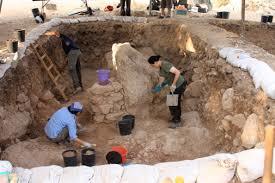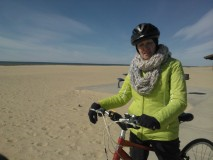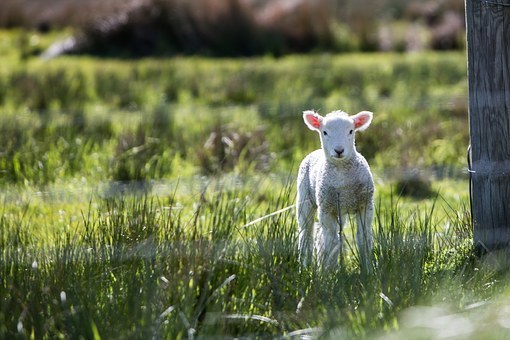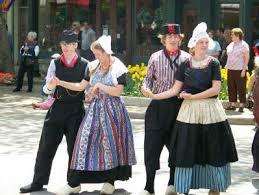Lynn Austin's Blog, page 8
August 5, 2019
Companions for the Journey

I’ve been going through photographs from my bicycle trip through Europe last June, and before the memories fade, I want to share some lessons I learned along the way. My bike tour, like the Body of Christ, relied on three very important people—the Guide, the Corner, and the Sweep.
The Guide, of course, is Jesus. He knows the way and all of the challenges we’ll face. He has traveled this way before us. The Guide also knows the way to our final destination—the hotel—and His Father’s House in Heaven, where there’s a place prepared for us. But we won’t get there unless we follow Him. Our Guide led us up some pretty steep paths, and through harrowing, traffic-congested cities. There were times I didn’t want to follow him. But I knew that if I went my own way, I would get lost. Jesus said, “I am the way . . . No one comes to the Father except through Me.”

The Corner can be anyone in the group. When the Guide comes to an intersection with several choices, he turns to the rider behind him and says, “I need a Corner.” The rider gets off his bike and waits at the intersection to point the way. When everyone has cycled past, the Corner rejoins the group. It’s an important responsibility.

The first day of the trip, I didn’t understand that there’d be a Corner to point the way, so I exhausted myself trying to keep the Guide in sight. And we can exhaust ourselves trying to follow Jesus, too. But He faithfully appoints members of His Body to serve as Corners at important crossroads, pointing the way. We don’t have to make this journey by ourselves. Jesus asks us to take our turn guiding others who are a little behind us on the journey. It means being ready, knowing scripture and the Guide’s voice well enough to point the way.
On the second day of the trip, another newbie like me was told to be a Corner, and when she thought everyone had passed the intersection, she left her post. It turned out that 4 riders were still behind her, and they became lost. The Guide, like the Good Shepherd, left his flock to wait along the trail while he went back to “seek and save the lost.”
The Sweep is just as important as the Corner. Before setting out in the morning, the Guide asks for a volunteer to be the Sweep. The Sweep rides behind everyone else, waiting for stragglers and dawdlers and those who’ve grown weary. Nobody enjoys being last, but a good Sweep cares about his slowpokes and waits patiently for them. When the Corner sees the Sweep, he knows that everyone has safely passed.
I think Jesus is pleased when we volunteer to be the Sweep and care for the stragglers. It’s hard being patient with those who seem slow to learn, or who keep making the same mistakes in their journey. We can grow weary of sweeping up other people’s messes. But a good Sweep shares the Shepherd’s heart for the lost.

One day on our trip, I was one of only three people in my group of 12 who was pedaling the old-fashioned way. The others rode e-bikes with batteries and 3-speed power-assist motors. I was feeling pretty proud of myself for tackling the journey on my own power—until we came to a very challenging hill. (We were in Switzerland, after all!) I shifted into the lowest gears and gutted my way up the slope—still feeling proud. I was almost to the top—legs burning, lungs heaving—when I saw that the top wasn’t the top! The road curved and the steep hill continued!
I was done. I had to get off and walk. The e-bikes zoomed past. Then the Sweep caught up with me. He also had an e-bike. I told him he could wait for me at the top, but he said, “No, I’m not leaving you behind.” He got off and walked beside me. After a minute or so he said, “Here, why don’t you ride my bike and I’ll ride yours?” I knew exactly how the man in Jesus’ parable felt when he lay beaten along the road and the Good Samaritan loaned him his donkey! I swallowed the rest of my pride and accepted his offer. Zoom!—all the way to the top!

It’s difficult to be the one who needs help. It’s especially hard for me to confess that I’m weary and hurting and needing prayer. But the Guide has some very special people who have volunteered to be Sweeps. They’ll walk alongside us when the road becomes difficult—if we ask. And I also need to be willing to help someone else who has grown weary, walking with them along the way.
Our journey of discipleship, like my bike trip, is an exciting one. There are some amazing views at the top! The best advice I can give, is to “Trust in the Lord with all your heart and lean not on your own understanding; in all your ways acknowledge Him, and He will direct your path” (Proverbs 3:6). Have a great trip!
July 15, 2019
Re-living History
In case you can’t tell, I love history—both reading it and writing about it. I especially enjoy learning about local history. This beautiful resort, The Hotel Ottawa, once stood near the Lake Michigan beach where my husband and I walk every day. It was featured as a setting in my novel, “Waves of Mercy,” which takes place in 1897.
 The hotel was a popular tourist destination in the late 1800s when steamships brought guests, like the heroine in my novel, across Lake Michigan from Chicago to vacation at the beach. Unfortunately, the hotel burned down in 1923 and wasn’t rebuilt. The only thing that’s left is the brick pumphouse that once generated electricity for the hotel and nearby cottages. The pumphouse is now a lovely little museum that features a display of the hotel’s guest book and other artifacts from that time period.
The hotel was a popular tourist destination in the late 1800s when steamships brought guests, like the heroine in my novel, across Lake Michigan from Chicago to vacation at the beach. Unfortunately, the hotel burned down in 1923 and wasn’t rebuilt. The only thing that’s left is the brick pumphouse that once generated electricity for the hotel and nearby cottages. The pumphouse is now a lovely little museum that features a display of the hotel’s guest book and other artifacts from that time period.
 Last week I was asked to speak at the Pumphouse Museum as part of their summer lecture series. The warm, enthusiastic audience listened, on that beautiful summer evening, as I spoke about my book and my journey as a writer. The story of my writing career and how I got started is really the story of God’s faithfulness over the years. Each time I tell it, I’m reminded of all the hard times and all the little miracles along the way—as well as the lessons God taught me through each one. He used the ups and downs of my writing journey to draw me closer to Him, and so each time I tell my story, I’m really telling about His goodness and love.
Last week I was asked to speak at the Pumphouse Museum as part of their summer lecture series. The warm, enthusiastic audience listened, on that beautiful summer evening, as I spoke about my book and my journey as a writer. The story of my writing career and how I got started is really the story of God’s faithfulness over the years. Each time I tell it, I’m reminded of all the hard times and all the little miracles along the way—as well as the lessons God taught me through each one. He used the ups and downs of my writing journey to draw me closer to Him, and so each time I tell my story, I’m really telling about His goodness and love.
My goal as I write about the past in my novels is to help readers grow in faith to face today’s challenges. The Bible says, “For everything that was written in the past was written to teach us, so that through endurance and the encouragement of the scriptures we might have hope” (Romans 15:4). It’s speaking about the written scriptures, but I think it’s also a good reason why we should read and study history. It gives us hope. History helps us see the bigger picture behind world events and God’s hand in them. And that helps us put the challenges we face in clearer perspective. We begin to see that, great or small, we all have a part to play in God’s plan.
When you look back at some of the events in your life, where do you see Gods hand at work? How does that give you faith for today’s challenges?
July 1, 2019
Bucket Lists
What’s on your Bucket List—you know, that list of all the interesting things you would love to do someday before you “kick the bucket?” I had the privilege of crossing off one of my bucket list items several years ago when I worked on an archaeological dig in Israel for a month. Our team excavated the ancient city of Timnah, which is mentioned in the Bible as the town where Samson fell in love with a Philistine woman (see Judges 14). Things ended badly for Samson when she gave away his riddle and he called off the wedding. I worked in the area of the main city gate, and we uncovered the cobblestone street from Samson’s time. What a thrill to think that his feet once walked on those very stones! My oldest son Joshua, who was 14 at the time, went on the dig with me. His wish was to find a skull (of course!) He was excavating a different section of the city and his group ended up finding a complete skeleton! He could happily cross that off his bucket list.
My oldest son Joshua, who was 14 at the time, went on the dig with me. His wish was to find a skull (of course!) He was excavating a different section of the city and his group ended up finding a complete skeleton! He could happily cross that off his bucket list.
We started work before dawn to avoid the summer heat and finished by noon. We were on level ground when we began digging, and by the last day, we were standing in a pit that was several feet above our heads. We moved a lot of dirt! But what fun to discover buried treasures. The experience was everything I’d hoped for, and I would definitely go on a dig again if I had the chance.
A few weeks ago I was able to cross off one item on my list. Ken and I toured in Europe by bicycle with a group of friends from our church. We flew to Zurich, Switzerland to begin our bike journey around Lake Constance. We cycled 25-35 miles a day on this ten-day trip, and traveled through parts of Germany, Austria, and Switzerland, which all border the lake. Along the way, we visited Medieval cities, saw a zeppelin museum, and toured the oldest castle in Germany. We stayed in lovely hotels at night and sampled fine cuisine (and slept like the dead!) I kept a journal and will be posting my story and pictures on a future blog.
Along the way, we visited Medieval cities, saw a zeppelin museum, and toured the oldest castle in Germany. We stayed in lovely hotels at night and sampled fine cuisine (and slept like the dead!) I kept a journal and will be posting my story and pictures on a future blog. We’ve been preparing for this trip since January when we logged 120 miles while vacationing in Florida. The weather in Michigan this spring has been so cold and rainy (and snowy!) that we’ve only been able to log 115 miles in preparation.
We’ve been preparing for this trip since January when we logged 120 miles while vacationing in Florida. The weather in Michigan this spring has been so cold and rainy (and snowy!) that we’ve only been able to log 115 miles in preparation. But I love to bike! I feel so alive and happy as I pedal away, absorbing all the sights and sounds and smells. Riding my bike was one of my happiest pastimes as a child, which is why I feel like a kid again whenever I ride (aside from the aches and pains that now come with age). I have a feeling that I’ll be planning our next bike trip as soon as I return from this one.
But I love to bike! I feel so alive and happy as I pedal away, absorbing all the sights and sounds and smells. Riding my bike was one of my happiest pastimes as a child, which is why I feel like a kid again whenever I ride (aside from the aches and pains that now come with age). I have a feeling that I’ll be planning our next bike trip as soon as I return from this one.
So, what things have you checked off your bucket list? What’s on your list to do next?
June 16, 2019
The best writers are readers
I am thrilled to welcome my friend Rachel McMillian as a guest blogger this week. Ken and I are on a bike trip in Europe and I’m so thankful that Rachel was willing to help me on the blog. I hope you enjoy her writing, look for her books and add them to your “To Be Read” pile. Welcome Rachel!

As a writer, I use books as some people might a course or a workshop: studying structure, and dialogue. Noticing the way an author immerses me in a world, culture and moment in history that inspires me to read more. But reading not only enhances my ability and confidence as a writer, it helps me strive to be a better human. For instance, several publications including the Washington Post and the New York Times have lately featured research suggesting a correlation between reading and empathy. As a woman of faith, empathy is a natural extension of my Christian worldview. As a writer and reader, empathy is a sure-fire way to ensure a created character is an extension of a fictional friend.
While I read to learn from authors who excel at their craft, I also read for encouragement: to find the characters who parallel my journey, who express my doubts and my fears, who I empathizewith. When Christy Huddleston asks Miss Alice endless questions after she moves to Cutter Gap in Catherine Marshall’s masterpiece Christy, I see a bit of myself in her earnest desire to encounter God and His word on a deeper level. One of the most powerful moments in my reading life occurred when I read a scene in Lynn Austin’s Fire by Night. Julia Hoffman, a nurse in the Civil War era, recognizes she has much to offer the world beyond her cushioned upbringing and wonders how she is supposed to follow her fiancé Nathaniel Greene without question– even as God nudges her to serve others and use her recently discovered gifts:
“But aren’t women allowed to hear from God?” she asks her friend Phoebe. “Are only our fathers or our husbands qualified to tell us what God wants? I thought’s Id heart God speaking to me.[…] So should I try to become the person he wants me to be or the person God wants me to be?”
This conversation in my copy of the novel is translucent with wear, underlined and highlighted. It spoke so deeply into my own insecurities as a woman of faith and challenged me to seek out God’s voice beyond human expectation.
In Charles Dickens’ Great Expectations, grace is incarnate in the character of Joe Gargery-a kind blacksmith and the protagonist’s brother in law who time and again pays ungrateful Pip’s debts and welcomes him home with open arms despite cruel and neglectful treatment. There is empathy here, sure. There is also Christ’s love. We are alwayswelcome with Him—no matter what we have done.
So, yes, I learn about structure and syntax, story and pace when I read a novel as a writer. But most importantly reading reaffirms who I am. It challenges and encourages me. It strengthens my empathy and my Christian faith. It allows me to step into another person’s shoes and walk around in them (to paraphrase Atticus Finch in To Kill a Mockingbird).
In my latest historical series, the catalyst that sends my hero Hamish DeLuca, a talented Toronto lawyer to Boston, is a panic attack. Hamish, thus, flourishes in his adopted home: finding footing as an amateur sleuth. But, he still suffers from an anxiety and panic disorder in an era where his symptoms were heavily stigmatized and largely misunderstood. Hamish’s mental illness and his symptoms come by him honestly. I don’t impart anything on him that I have not experienced myself. In this vulnerable way, I am able to hopefully establish empathy in my relationship with my readers and combine my earnest love of writing with the hope and passion I have encountered through the fiction I re-read and cherish.
The best writers are readers.
So read on: those who read to inform their own scribblings and those who read to find themselves in other people’s pages. Read to help you become a better writer. Read because it will make you a better human. Read to ask questions and read because it asks the questions you might have been afraid to ask. Read in every occasion. Given enough time and page I guaranteeyou will find yourself—again and again— read because empathy is alive and apparent in the well-worn pages of a favourite book.
Rachel McMillan is the author of the Herringford and Watts mysteries, the Three Quarter Time series of contemporary romances set in opulent Vienna, and the Van Buren and DeLuca mysteries praised for bringing an authentic 1930’s Boston world to life while normalizing the fictional conversation surrounding mental illness. Her first work of non-fiction, described as a romantic’s guide to independent travel, releases in 2020. Rachel lives in Toronto, Canada
June 3, 2019
Majestic Mountains
 This is the view of the Rocky Mountains that I woke up to every morning last week. My husband and I spent the week vacationing in Estes Park, Colorado with our daughter, son-in-law, and two granddaughters. Each day, we hiked the trails in Rocky Mountain National Park and enjoyed the breathtaking scenery. I couldn’t get enough of these awesome mountain views.
This is the view of the Rocky Mountains that I woke up to every morning last week. My husband and I spent the week vacationing in Estes Park, Colorado with our daughter, son-in-law, and two granddaughters. Each day, we hiked the trails in Rocky Mountain National Park and enjoyed the breathtaking scenery. I couldn’t get enough of these awesome mountain views. I know that the word “awesome” is overused these days and trivialized, but it’s the only word that can begin to describe these mountains. I envy those of you who see views like this every day. Do you ever become so used to them that you stop noticing? I hope not.
I know that the word “awesome” is overused these days and trivialized, but it’s the only word that can begin to describe these mountains. I envy those of you who see views like this every day. Do you ever become so used to them that you stop noticing? I hope not. Of course, the wonders of God’s creation are all around us if we take time to notice them, but there’s something about this mountain scenery that left me in awe of God’s glory and splendor in a fresh way. At times, I was rendered speechless by their beauty. At other times I wanted to shout, “See these mountains? My Father made them!”
Of course, the wonders of God’s creation are all around us if we take time to notice them, but there’s something about this mountain scenery that left me in awe of God’s glory and splendor in a fresh way. At times, I was rendered speechless by their beauty. At other times I wanted to shout, “See these mountains? My Father made them!” I can understand how people who don’t know God might imagine that He must be like these majestic mountains—cold and distant and inaccessible. But that isn’t how He reveals himself in scripture. We don’t have to labor and strive to climb some lofty, spiritual peak in order to reach Him. Instead, He came down to us through His Son.
I can understand how people who don’t know God might imagine that He must be like these majestic mountains—cold and distant and inaccessible. But that isn’t how He reveals himself in scripture. We don’t have to labor and strive to climb some lofty, spiritual peak in order to reach Him. Instead, He came down to us through His Son. And maybe that’s what left me so breathless whenever I gazed at the mountains. Imagine! The Creator of something this enormous and magnificent and beautiful loves you and me!
And maybe that’s what left me so breathless whenever I gazed at the mountains. Imagine! The Creator of something this enormous and magnificent and beautiful loves you and me!
May 20, 2019
Searching for Spring

Spring has been a long time coming to my corner of southwest Michigan. This was the view from my window just a few weeks ago in April. Not very inspiring! But the weather has finally warmed up enough for me to go biking again—if I bundle up. My husband and I took a short, twelve mile ride the other day and I decided to search for signs that spring is finally here. These are some of the sights we saw from our favorite bicycle trail:
The boats are coming out of storage for the season and filling the marina.

The underbrush in the woods is starting to turn green.

Wildflowers are in bloom!

Farmers are plowing their fields.

Fruit trees are blossoming.

And this park along Lake Michigan is open again—one of our favorite spots for a (chilly) picnic lunch.
All in all, these hints of spring give me hope for warmer days, and future summer bike rides. I can even begin to imagine sitting on the beach with a good book to read. Spring is a season of hope. I often wonder if Adam and Eve despaired that first winter after they left Paradise, wondering if those “dead,” barren trees would ever live again. How they must have rejoiced to see flowers bloom and new buds appear!
Perhaps nature’s changing seasons were meant to teach us that life also has seasons of darkness and cold—but that God can bring renewed life, even from situations that seem beyond hope. I don’t think it’s an accident that the joy of Easter and Christ’s resurrection come in the Springtime. And with the hope that He brings, maybe I can patiently wait just a little longer for that “hopeless” situation or “dead” relationship to finally bear fruit.
“As long as the earth endures, seedtime and harvest, cold and heat, summer and winter, day and night will never cease.” Genesis 8:22
May 6, 2019
Unfailing Love
I knew the visit to the nursing home would be difficult. I wasn’t prepared for a miracle.
I went there with my friend Cathy, whose older sister suffers from Alzheimer’s disease. I knew Muriel in years past as a vibrant, happy woman who enjoyed life and dearly loved her family and her Lord. It was painful to see the empty shell she has become. She sat slumped in a wheelchair with a blank expression on her face, her eyes dead and lifeless. The other patients in the lounge looked much the same—without life, without hope. I battled tears, my heart aching for Muriel and for Cathy. I lost my older sister Bonnie to cancer a few years ago, and I miss her terribly. But this “living death” seemed much more tragic.
Cathy sat down beside Muriel and gathered her into her arms for a long, sweet hug. She kissed her, and smoothed back her hair, and told Muriel who she was, and how much she loved her. And even though there was no response or any sign of recognition, Cathy took Muriel’s hands, and looked deeply into her eyes, and continued talking, pouring out her love.
Slowly, almost imperceptibly, a light came into Muriel’s eyes as she began to respond to Cathy’s love. She sat up a little straighter. A gentle smile lit her face. And the love I’d seen in Cathy’s eyes soon filled Muriel’s eyes, too. She may not have known Cathy’s name or who she was, but Muriel knew that Cathy was someone who loved her, someone she had once loved in return.
It was a holy moment. Like watching the sunrise after a long, dark night. Like watching a winter-dead tree slowly bud and blossom. Even though Muriel’s mind had lost its ability to think or remember, her eternal soul knew and understood love. And for a few, precious moments, Muriel was filled with life once again. I wanted to go around the room to all of the other patients and hug them, and show them love so they could come alive, too! But, of course, I couldn’t. I had no right.
Yet, isn’t that what we’re supposed to do? Those of us who know the beauty and joy of God’s unfailing love—aren’t we supposed to generously give it away to everyone around us? Whether they respond or not? Whether they return it or not? I think of all the “living dead” people I see every day, going through life with blank eyes and hopeless expressions. What might happen if I found a way to draw them close to me, and look into their eyes, and tell them how much God loves them? Could I earn the right to do that through acts of undeserved grace, and kindness, and selfless sacrifice? Might their eternal souls respond to love?
That’s how Jesus demonstrated His love to me when I was “dead.” And because of His love, I am now alive with eternal, everlasting life. How He must long for me to freely give His love away to others.
Lord, open my eyes, today, to see who needs to be touched by Your love. Then give me the courage and grace to love as You do.
April 15, 2019
Spring Fever
Everyone I know has Spring Fever, including me. The sun is shining, the sky is blue, and the last few piles of dirty snow are melting at last. The steady drip of snowmelt from the eaves outside my office sounds like a drumbeat, summoning me to come outside and play. The season of new beginnings is here.

And it’s a new beginning for my next writing project, too. My contract schedule has me handing in my manuscript in February then completing any changes my editor asks for by May. I’m just finishing that process now, and getting ready to turn in all of my final changes and edits. That means I’ll soon be ready to start the process all over again with a new book.
But where will my ideas come from? How will the next story begin to form in my mind? Every author is different, but I begin by replenishing my supply of words. That means reading lots and lots of books. I choose authors who not only know how to tell a great story but also have an extraordinary love of language. One of my favorite writers, Rosamunde Pilcher, can not only tell a gripping tale, but she paints word-pictures that are so vivid they make me shiver: “Antony opened the front door, and the cold wind flowed in like a sluice of icy water.” Brr!
At the same time, I start reading lots of non-fiction books about the historical time period I’ve chosen. This includes first-person accounts such as diaries or memoirs written by people who might have lived alongside my fictional characters. Whenever possible, I visit the setting for my new novel to absorb all the sights and sounds and smells, keeping track of them in a notebook for future use. I also love to ask people to tell me their love stories, or their God-stories, or their family’s story. (Warning: don’t ever tell me a story unless you’re not afraid to see it in one of my books!) I’ll be creating what I call “story soup,” tossing images and ideas and historical facts into a huge pot and letting it all simmer together in the back of my mind until I’m ready to start writing.
One of the things I love to do while these ideas and images are simmering is to go outside in the gorgeous spring sunshine and sample God’s creative handiwork. I want the theme of His redemption to flow through all of my novels—how he takes what is broken and cold and dying and fills it with renewed life. And seeing the beauty of rebirth in nature as the snow melts and the new grass and spring leaves began to peek through, inspires me to tell of His goodness and grace all over again.

After the overwhelming destruction and judgment of the flood, God promised Noah—and all of us—that “As long as the earth endures, seedtime and harvest, cold and heat, summer and winter, day and night will never cease” (Genesis 8:22). We will always have seasons in life that feel like a long, dark, frigid winters—those times when life hits us in the face like “a sluice of icy water.” But He is the God of Springtime and new beginnings and second chances. He breathes life into the cold, dark corners of our hearts and we begin to find joy again. “Behold! I make all things new!”

No wonder we have Spring Fever. Let’s go dance in the snow-puddles!
April 1, 2019
Celebrating Community
I’ve done a lot of odd and interesting things in my life as an author, but being auctioned off at a fundraiser last week was a first! Happily, it was for a very good cause—the 90th annual Tulip Time Festival—and it turned out to be a lot of fun. The evening included a gala dinner, entertainment, and lots of other prizes to bid on besides me. Each May since 1929, the town where I live—Holland, Michigan—has celebrated their Dutch cultural heritage with nine days of festivities known as Tulip Time. The festival draws more than 500,000 people, who come to see klompen dancers perform in wooden shoes; parades with marching bands and floats; and more than 5 million tulips blooming in every color of the rainbow. Reader’s Digest magazine named it America’s Best Small-Town Festival.
Each May since 1929, the town where I live—Holland, Michigan—has celebrated their Dutch cultural heritage with nine days of festivities known as Tulip Time. The festival draws more than 500,000 people, who come to see klompen dancers perform in wooden shoes; parades with marching bands and floats; and more than 5 million tulips blooming in every color of the rainbow. Reader’s Digest magazine named it America’s Best Small-Town Festival. Today Holland’s population is culturally diverse, but everyone loves to participate in Tulip Time whether they are Dutch or not. Area high school students dress in authentic costumes and wooden shoes to perform traditional Dutch folk dances, but the highly-detailed costumes cost a lot of money to create. That’s what the gala fund-raiser was for. I agreed to be auctioned-off to raise funds so that everyone who wanted to participate as a klompen dancer could afford an authentic costume. And soon I will join the winning bidder and her book club to talk about my novel “Waves of Mercy.” I’m very excited!
Today Holland’s population is culturally diverse, but everyone loves to participate in Tulip Time whether they are Dutch or not. Area high school students dress in authentic costumes and wooden shoes to perform traditional Dutch folk dances, but the highly-detailed costumes cost a lot of money to create. That’s what the gala fund-raiser was for. I agreed to be auctioned-off to raise funds so that everyone who wanted to participate as a klompen dancer could afford an authentic costume. And soon I will join the winning bidder and her book club to talk about my novel “Waves of Mercy.” I’m very excited!
“Waves of Mercy” tells the story of the original settlers from the Netherlands who founded the village of Holland in 1846, seeking religious freedom. I purchased an authentic Dutch costume to wear for the novel’s debut. The wooden shoes I’m wearing in the picture were once my husband’s. He grew up here in Holland, and his high school band wore wooden shoes when they marched in the Tulip Time parades. If you look closely, you’ll see I’m actually wearing two left shoes—and it’s not because I dance as though I have two left feet! (Although that’s probably true.)
It’s because band members’ wooden shoes often fly off and get broken during their marching routine, so by the time my husband graduated, all he had left were two left shoes. The Holland band still performs the same routine to the same tune, “Tiptoe Through the Tulips,” and their wooden shoes still go flying. Be ready to duck if you visit Tulip Time!
My husband is half Dutch. His mother’s ancestors immigrated to Holland from the Netherlands in 1872. I don’t have a Dutch bone in my body. Ken and I met at Hope College, right here in Holland, Michigan, and I remember being intrigued by the flood of tourists who came to see the tulips every year. As I was crossing the campus with an armful of books one spring, a pair of tourists loaded down with camera equipment stopped me to ask if I was a Hope student. When I told them I was, they asked if they could please take my picture beside Hope College’s iconic anchor. I agreed, and struck a pose. Suddenly, the wife shouted, “Wait a minute! Are you Dutch?” When I told her I wasn’t, she said, “Never mind.
I think it’s wonderful that participants don’t have to be Dutch in order to be klompen dancers or to march in the parades. And I love the fact that my community can celebrate its cultural origins while still enjoying its modern diversity. From their earliest days, Holland’s founders never sought to be an exclusive enclave, closing its doors to “outsiders” who didn’t share their ethnicity or their strong, Christian faith. They must have done something right because faith remains a very strong component in our community. This diverse city of approximately 33,000 has more than 70 churches. And the Tulip Time Gala Dinner and auction began with a prayer of thanks to our Heavenly Father, acknowledging that our faith in Christ makes us one. To paraphrase scripture, “There is neither Jew nor Greek, slave nor free, male nor female, Dutch nor non-Dutch, for you are all one in Christ Jesus.”
Now, that’s something to celebrate!
March 18, 2019
Nourishing Your Dream
Last week, I had the pleasure and honor of teaching at the Florida Christian Writers Conference, hosted by an organization called Word Weavers. Writers from several states and even Canada came to hear speakers, meet with editors and literary agents, get inspired, and learn how to get published. As I talked with other writers about their hopes and dreams, I remembered my very first conference and my own journey to publication—and it was a long one! From the time I first put a sheet of paper into my typewriter (yes, a manual typewriter!) until my first book was finally published, the journey took eleven years.

Not everyone dreams of being a writer, but I firmly believe that God has planted a dream in each person’s soul that fits them perfectly. You are created for a purpose, something only you can accomplish for His kingdom and His glory. One of the biggest obstacles I faced in becoming a published author was the same one that many of us face: FEAR. What if I wrote for years and never got published? What if I was no good? What if people laughed? I was so afraid of failing and of being criticized that I didn’t tell anyone but my husband that I wanted to be writer.
One day during my quiet time, I realized that my fear was killing my dream. If I really trusted God and His plan for me, I needed to bring the seeds of my dream into the sunlight and nourish them so they could grow. I had to risk calling myself a writer.
 Not long afterwards, I was busy writing one Saturday morning while my children played nearby and my husband taught music lessons to a parade of students. As one young student waited for his turn, he wandered up to me and asked what I was doing. I hesitated. Should I admit to this 16-year-old stranger that I wanted to be a writer? I decided to set aside my fear and trust God, so I replied, “I’m writing a novel. I’m a writer.”
Not long afterwards, I was busy writing one Saturday morning while my children played nearby and my husband taught music lessons to a parade of students. As one young student waited for his turn, he wandered up to me and asked what I was doing. I hesitated. Should I admit to this 16-year-old stranger that I wanted to be a writer? I decided to set aside my fear and trust God, so I replied, “I’m writing a novel. I’m a writer.”
“That’s really cool,” he said with a huge grin. “My mom is a writer, too. You should meet her sometime.”
I was speechless! When I finally could talk, I asked, “What does she write?”
“We’re Christians,” he said. “She writes devotional books for Moody Press in Chicago.”
The following week, the student’s mother came to his music lesson with him. And from that day on, this gifted Christian writer, Alma Barkman, took me under her wing and mentored me. I lived in a city of more than 300,000 people, yet God had brought a published Christian author right to my doorstep and into my life. I wonder where I would be today if I had been too fearful to call myself a writer?
 One of the first things Alma did was invite me to her writers’ critique group. Again, fear nearly defeated me. How could I possibly read my feeble work to other writers and risk criticism? No way! But when I set aside my fear, I quickly discovered how helpful it was to have unbiased readers critique my work. Alma also told me about writers’ conferences like the one where I taught last week, and she accompanied me to my very first one. Twenty-seven published books later, I am still grateful to Alma, and very glad that I didn’t let fear stop me from pursuing God’s dream for me.
One of the first things Alma did was invite me to her writers’ critique group. Again, fear nearly defeated me. How could I possibly read my feeble work to other writers and risk criticism? No way! But when I set aside my fear, I quickly discovered how helpful it was to have unbiased readers critique my work. Alma also told me about writers’ conferences like the one where I taught last week, and she accompanied me to my very first one. Twenty-seven published books later, I am still grateful to Alma, and very glad that I didn’t let fear stop me from pursuing God’s dream for me.
 If your dream is to write, I urge you to look into the Word Weavers organization and find a local group of fellow writers near you. (www.word-weavers.com) We all need companions and mentors for this journey. But whatever your God-given dream is, (and I know it’s one that fits you perfectly!) please don’t let fear hold you back a single day longer. Ask God to give you the courage to bring your dream into the sunlight where it can grow. I promise you, God “is able to do immeasurably more than all we ask or imagine” (Ephesians 3:20)
If your dream is to write, I urge you to look into the Word Weavers organization and find a local group of fellow writers near you. (www.word-weavers.com) We all need companions and mentors for this journey. But whatever your God-given dream is, (and I know it’s one that fits you perfectly!) please don’t let fear hold you back a single day longer. Ask God to give you the courage to bring your dream into the sunlight where it can grow. I promise you, God “is able to do immeasurably more than all we ask or imagine” (Ephesians 3:20)



